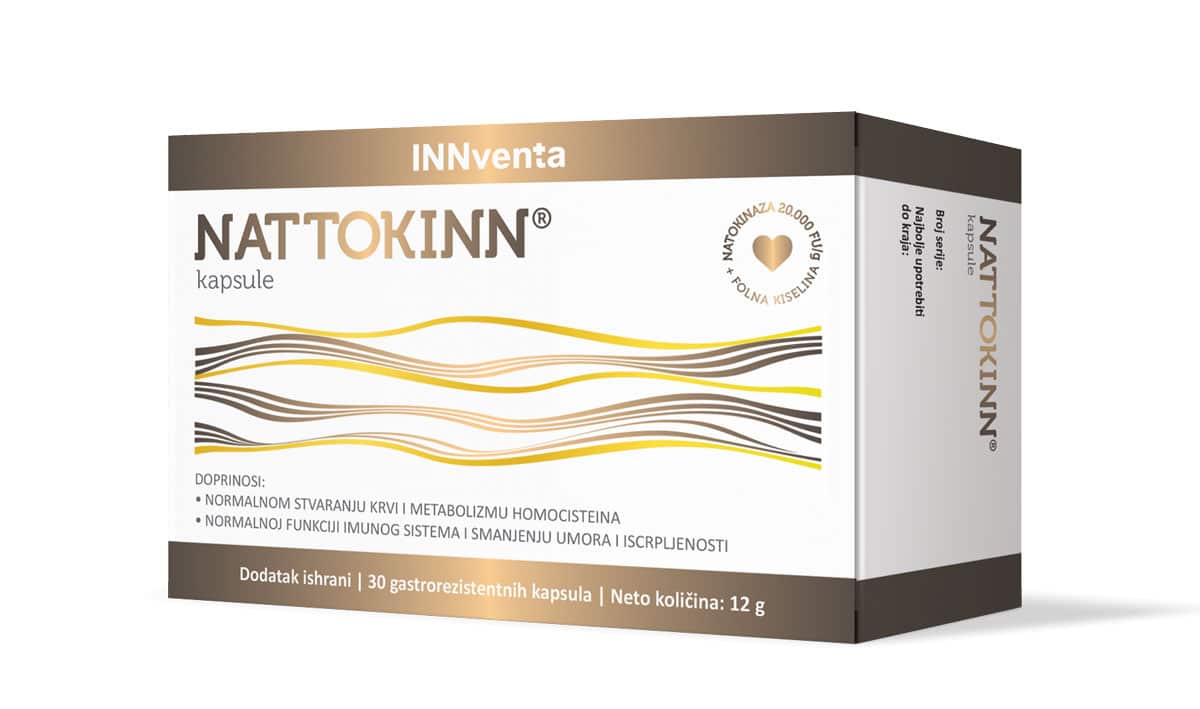
NATTOKINN®

NATTOKINN® is a dietary supplement with fermented soybean extract containing the proteolytic enzyme nattokinase NSK-SD® and folic acid. Folic acid, as calcium-L-methylfolate, plays a role in the process of cell division, contributes to normal blood formation, as well as normal homocysteine metabolism. Also, folate contributes to the normal function of the immune system and to the reduction of fatigue and exhaustion.
Thanks to its unique mechanism of action, NATTOKINN® reduces the risk of heart attack and stroke, prevents the appearance of new blood clots, lowers blood pressure levels, reduces the extent of atherosclerosis and prevents the sticking of platelets, reduces blood fat levels, improves circulation and protects the nervous system.
Nattokinase NSK-SD® is a patented formulation containing the original nattokinase, originally from Japan, on which numerous clinical studies were conducted that proved the therapeutic effects of this enzyme.
In which conditions is the administration of NATTOKINN® recommended?
- In people who have an increased risk of blood clots in the heart, brain or deep veins in order to prevent heart attack and stroke
- As an adjuvant therapy of persons with elevated blood pressure
- People with elevated levels of fat in the blood
- People with elevated homocysteine values
- To prevent the occurrence of swelling and venous stasis during long trips
- For protection of nervous system

What does NATTOKINN® contain?
Active ingredients: | 1 capsule |
|---|---|
Fermented soybean extract (nattokinase NSK-SD® 20.000 FU*/g) | 100 mg |
Folic acid (calcium-L-methylfolate) | 200 µg |
*FU – Fibrinolytic units
Nattokinase is an enzyme isolated from the traditional Japanese dish nattō, which is obtained by fermenting soybeans and adding the bacterium Bacillus subtilis natto, which effectively breaks down fibrin (a protein involved in blood clot formation). Nattokinase lowers blood pressure, lowers blood fats, affects the atherosclerosis process, blocks the sticking of platelets and provides protection to the nervous system. Thanks to its beneficial effects, nattokinase can be used as a dietary supplement in the prevention and as adjuvant therapy of cardiovascular diseases.
Precautions:
Caution and consultation with a doctor are required before administering NATTOKINN® in people with an increased risk of bleeding, people taking anticoagulant therapy, as well as people with low blood pressure values.
Note: Nattokinase cannot replace prescribed anti-clotting therapy. Surgical interventions increase the risk of bleeding, which is why it is advised to stop taking nattokinase at least two weeks before the planned surgical procedure.
Safety:
Previous experimental, clinical and toxicological tests of nattokinase have not recorded any adverse reactions when using this product. Nattokinase is an enzyme present in the daily diet of the Japanese population, which additionally speaks in favour of its safe use. In addition, the bacterium that ferments soybeans during the production of nattokinase (Bacillus subtilis natto) does not cause disease in humans.
Method and lenght of use:
Adults: 1-2 capsules a day with about 200 ml of water.
Length of administration: NATTOKINN® is a dietary supplement and duration of its use cannot be defined. It is advised that minimum length of administration is 2 months or according to the doctor’s advice.
Presentation: 30 gastroresistant capsules.
